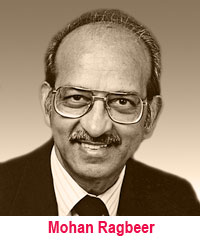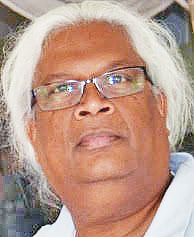Opinions
QC 175th

On October 25th, Queen’s College of Guyana celebrated its 175th anniversary (Aug 5, 2019), with suitable events in Georgetown, New York, London and shortly, on Dec 7th in Toronto, hosted by the QC Old Students Association. I would have loved to have attended the home base celebrations, as I have deep connections with Q.C., even though forces seemed to have worked to sully those links. QC educated many of the country’s leaders from the beginning, including Cheddi Jagan, first Premier, 1953, Forbes Burnham, first independent PM, many current Parliamentarians and the President David Granger.
My modest claim to fame, was that I founded, against many odds, edited and defended the school paper, which I christened the QC Lictor, an enigma at the time for students, until Deputy Principal Beckles, a classics scholar, explained it at school assembly, after the paper appeared. Perhaps the Archbishop of Guiana, then Rev Alan Knight, chair of the board of Governors, expressed the meaning best, in a letter to me, “I like the virility of your chosen title, but I tremble at its obvious implications. Who would not? All men stand equal before the Lictor as before the Law. And even we who are Governors of the School, can claim no diplomatic immunity from due castigation, if and when we deserve it…I trust that you will fulfil your office without fear or favour, but always in the best interests of Queen’s College.” Besides the Lictor, I could claim a school house cricket record, 9 wickets for 1 run and 19 for 21 in three matches! I was also editor of the ‘49-‘50, School Magazine and sub-editor the previous year.

My toil for the Lictor held some excitement. We promised a second issue in two weeks. In vain. I didn’t know that everything we did had to go through the Colonial Secretary’s office. After the paper appeared, I was summoned there to an inquisition and was scolded that by publishing a “newspaper”, I had breached an obscure law aimed at censoring (or suppression, as in India) of Colonial publications. My questioner was Asst. Secretary Harry Christiani, brother of the WI cricketer Robert, and also an opening batsman for BGCC, now Guyana Cricket Club, who threatened me; but they had already altered my content, deleting three articles, one on the brand new PPP, with a scoop as I was the first person to interview Dr Jagan after the Party’s formation. That full story appears in The Indelible Red Stain, Bk 1. The second was on the new QC building at Thomas Lands: the budget was nearly halved, resulting in substitution of wood for brick in the central wing that housed labs, part of the library, and flammable stores. I had highlighted the slashed budget and the fire hazard, which “a poor country could ill afford.” The third was a plea for more Guiana scholarships; at that time Barbados gave ten in a population of 250,000, Trinidad six (1 million), Jamaica 10 or more, (2 million), and Guiana 2 (500,000). We called it stingy.
In sugar colonies, gov ernors did not educate the general public, but the natural evolution of events and pressures from the growth and aspirations of inhabitants forced their hand.
After emancipation, the missions started schools; by1840, there were over 100, increasing to 150 in a decade; the need for secondary schooling increased, then spottily met for the rich few, mainly white folk, privately. At that time, the British elite sent their children to England for baptism and schooling, or else hired a local tutor. When societal needs for a more educated work force increased, the rulers were pressed to start secondary education. The Anglican church responded and founded Queen’s College Grammar School (QC) on August 5, 1844, on Carmichael St., with Bishop Percy Austin as its first Principal.
The school accepted students, irrespective of colour, race, creed or social position, and followed the secondary academic syllabus of King's College, London, plus commercial subjects, such as book-keeping, shorthand and typewriting, with several free places, while donors could nominate a student per every ?100.
The school moved to Brickdam in 1925, and Thomas Lands in 1951; there were 260 students in 1939, and 355 in 1944. By the late 1940s, high schools had sprung up in larger villages facilitating rural students. The establishment of the UCWI in 1948 began to provide for tertiary education. QC provided a ‘classical’ and science education, preparing students for a career in the Colonial Service and in the professions.
In sugar colonies, gov ernors did not educate the general public, but the natural evolution of events and pressures from the growth and aspirations of inhabitants forced their hand.
After emancipation, the missions started schools; by1840, there were over 100, increasing to 150 in a decade; the need for secondary schooling increased, then spottily met for the rich few, mainly white folk, privately. At that time, the British elite sent their children to England for baptism and schooling, or else hired a local tutor. When societal needs for a more educated work force increased, the rulers were pressed to start secondary education. The Anglican church responded and founded Queen’s College Grammar School (QC) on August 5, 1844, on Carmichael St., with Bishop Percy Austin as its first Principal.
The school accepted students, irrespective of colour, race, creed or social position, and followed the secondary academic syllabus of King's College, London, plus commercial subjects, such as book-keeping, shorthand and typewriting, with several free places, while donors could nominate a student per every ?100.
The school moved to Brickdam in 1925, and Thomas Lands in 1951; there were 260 students in 1939, and 355 in 1944. By the late 1940s, high schools had sprung up in larger villages facilitating rural students. The establishment of the UCWI in 1948 began to provide for tertiary education. QC provided a ‘classical’ and science education, preparing students for a career in the Colonial Service and in the professions.
Uncle sets out on after-crisis mission
 Romeo Kaseram
Romeo Kaseram
In his later years an uncle of mine has taken it upon himself to traverse the countryside back in the homeland, riding his rickety motorcycle on what can be described as an after-crisis, much-later-in-life “mission”.
Without warning, and the requisite warm-up of the tired engine on his one working motor-bike, he decides he is setting out on yet another “mission”. They say journeys start off with a first step. However, for my uncle, there is a pre-step to be taken prior to that initial step – starting his reluctant motorbike, which apparently is far more sensible than he is, and has decided the time has come for rest and relaxation in retirement.
It takes nothing less than torturous jumping on the start-up pedal to get that antiquated machine running. Also, a lot of legwork is required from his one remaining good leg, since the other was maimed after a fall in a motoring accident. Of course, predictably, my uncle did not allow the fracture to heal properly, and still refuses to put his feet up.
That he now has acquired a limp is yet to be noticed by the many family members he visits throughout the country, since he deliberately does not dismount off the motorcycle, wisely preferring to keep the engine running once it has started. Consequently, most times, my uncle can be seen returning home at breakneck speed, his bladder also critically over the speed limit. For this, he has acquired the putative reputation as a speedster, and admiration from many young riders and biking wannabes for his recklessness and willingness to thumb his nose at speed enforcement officers.
It takes nothing less than one hundred hard descents, and counting, on that starting pedal, my uncle climbing upwards so the frail weight of his once sturdy body descends rapidly on his good leg, forcing the dog-leg lever down so it rotates the cranky crankshaft that forces the seized, single piston upwards. Chug, chug, splutter, splutter, cough, cough: from both uncle and motorbike; each start attempt is followed with frantic twists to the throttle, until the backyard fills with the acridity of gasoline, and is choking with the noxiousness of half-burned oil-fuel ignition.
Finally, with his labour evidenced as sweat on the brow, and many curses muttered under the breath and beyond reach of the grandchildren, thick black smoke bursts from the exhaust, and the motorbike begins an unhealthy chugging, its pistons skipping with hesitancy like a heart ready for failure, with an unhealthy, asthmatic rumbling deep inside the crankcase.
Thick clouds of black smoke drift into the house to accompaniments of staccato misfiring, the creeping fog cause for my aunt to hastily abandon her cup of tea. Her exit from the house is accompanied with eyes narrowed and annoyed, with one hand pressing a hastily snatched pot-cloth over her entire nose and mouth. Swirling through the fog, she calls each grandchild by name, rounding them up while clucking disapprovingly and with the irritation of a vexed mother-hen, pecking away at the bewildered brood until they are ensconced inside the house.
Meanwhile, my uncle is totally oblivious to the mayhem he has caused, absorbed as he is with hefty spit-polishing of the chrome on the gas tank on his faithful motorbike, enraptured in his decaying world to the accompanying symphony of an engine that is about to expire inside the death zone.
At the same time, my aunt is done forcefully closing all the doors, slamming the windows shut so the house is hermetically sealed, locking it down as if preparing for an invasion by aliens. When she is done putting the pot-cloth back on the stove, she returns to her interrupted cup of tea, microwaving it while adjusting her disarrayed hair, and smoothening it down along with her raised hackles.
Meanwhile, my uncle has finished polishing as best as his reluctant fingers would allow most of the discoloured chrome on the motorbike, so his face appears even more unfocused as it did when he started out. His next preparatory action is testing the springs on the motorbike with a bit of heavy lifting, then heavily dropping its rear end. The result is a solid, hard thump each time, the creaking and cracking sounds coming out of all of the motorbike’s nuts, bolts, and joints loud and crisp, the arthritic wear and tear undeniable except to the deceptive hearing of my stubborn uncle.
For his latest “mission”, he has taken it upon his bony shoulders to set out, search, and rescue as many abandoned motorbikes he can locate throughout the country. He sets out on this enterprise, as my aunt constantly complains, “whenever the Devil takes him”.
My uncle is obsessive as he is convincing; he has rescued close to 50 motorbikes in various states of ill-health. When he is not out chasing his windmills, he is happily cannibalising these found engines to keep his lamed motorbike limping along. If family members have not noticed its failing engine, it is because he keeps it running, always barely making it back home, the needle in the gas gauge dangerously low.
That he now has acquired a limp is yet to be noticed by the many family members he visits throughout the country, since he deliberately does not dismount off the motorcycle, wisely preferring to keep the engine running once it has started. Consequently, most times, my uncle can be seen returning home at breakneck speed, his bladder also critically over the speed limit. For this, he has acquired the putative reputation as a speedster, and admiration from many young riders and biking wannabes for his recklessness and willingness to thumb his nose at speed enforcement officers.
It takes nothing less than one hundred hard descents, and counting, on that starting pedal, my uncle climbing upwards so the frail weight of his once sturdy body descends rapidly on his good leg, forcing the dog-leg lever down so it rotates the cranky crankshaft that forces the seized, single piston upwards. Chug, chug, splutter, splutter, cough, cough: from both uncle and motorbike; each start attempt is followed with frantic twists to the throttle, until the backyard fills with the acridity of gasoline, and is choking with the noxiousness of half-burned oil-fuel ignition.
Finally, with his labour evidenced as sweat on the brow, and many curses muttered under the breath and beyond reach of the grandchildren, thick black smoke bursts from the exhaust, and the motorbike begins an unhealthy chugging, its pistons skipping with hesitancy like a heart ready for failure, with an unhealthy, asthmatic rumbling deep inside the crankcase.
Thick clouds of black smoke drift into the house to accompaniments of staccato misfiring, the creeping fog cause for my aunt to hastily abandon her cup of tea. Her exit from the house is accompanied with eyes narrowed and annoyed, with one hand pressing a hastily snatched pot-cloth over her entire nose and mouth. Swirling through the fog, she calls each grandchild by name, rounding them up while clucking disapprovingly and with the irritation of a vexed mother-hen, pecking away at the bewildered brood until they are ensconced inside the house.
Meanwhile, my uncle is totally oblivious to the mayhem he has caused, absorbed as he is with hefty spit-polishing of the chrome on the gas tank on his faithful motorbike, enraptured in his decaying world to the accompanying symphony of an engine that is about to expire inside the death zone.
At the same time, my aunt is done forcefully closing all the doors, slamming the windows shut so the house is hermetically sealed, locking it down as if preparing for an invasion by aliens. When she is done putting the pot-cloth back on the stove, she returns to her interrupted cup of tea, microwaving it while adjusting her disarrayed hair, and smoothening it down along with her raised hackles.
Meanwhile, my uncle has finished polishing as best as his reluctant fingers would allow most of the discoloured chrome on the motorbike, so his face appears even more unfocused as it did when he started out. His next preparatory action is testing the springs on the motorbike with a bit of heavy lifting, then heavily dropping its rear end. The result is a solid, hard thump each time, the creaking and cracking sounds coming out of all of the motorbike’s nuts, bolts, and joints loud and crisp, the arthritic wear and tear undeniable except to the deceptive hearing of my stubborn uncle.
For his latest “mission”, he has taken it upon his bony shoulders to set out, search, and rescue as many abandoned motorbikes he can locate throughout the country. He sets out on this enterprise, as my aunt constantly complains, “whenever the Devil takes him”.
My uncle is obsessive as he is convincing; he has rescued close to 50 motorbikes in various states of ill-health. When he is not out chasing his windmills, he is happily cannibalising these found engines to keep his lamed motorbike limping along. If family members have not noticed its failing engine, it is because he keeps it running, always barely making it back home, the needle in the gas gauge dangerously low.
